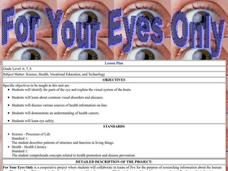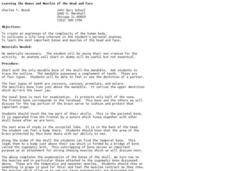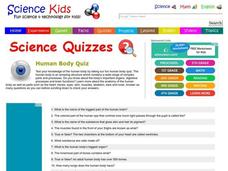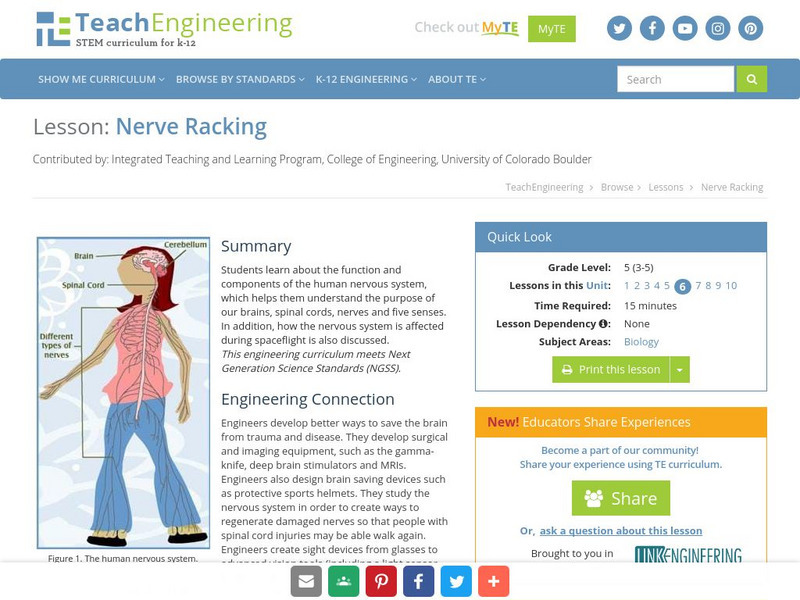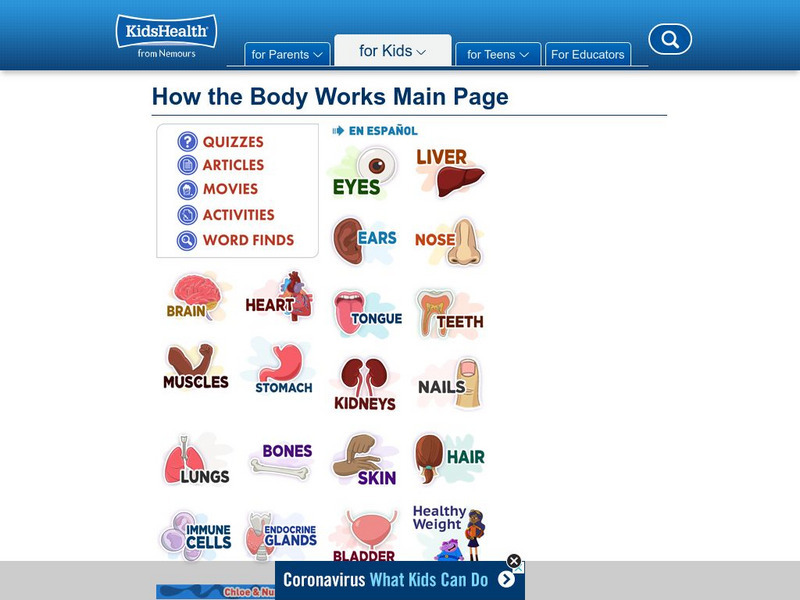Curated OER
Growing Eyeballs
Students investigate vision and the anatomy of the human eye. They complete a Webquest, watch a video about the structure of the eye, take an online quiz, answer discussion questions, and read newspaper articles about activities that...
Curated OER
Under the Influence
Students examine the effects of teen drinking. In this personal health lesson, students research alcohol's effect on the teen brain. Students discuss their findings about the alcohol-brain connection and create brain maps.
Curated OER
For Your Eyes Only
Students complete several activities in a unit related to the eye. In this eye lesson, students work in groups to research information about the human eye and create a multimedia presentation. They research anatomy of the eye, how the...
Mr. E. Science
Sound
Since light travels faster than sound, some people may appear bright until you hear them speak. The presentation covers what sound is, how fast it travels in various mediums, properties of sound, hearing, and the parts of the human...
Curated OER
Show 303: New Research into Dyslexia
Students explore the causes of dyslexia. They view CT sans and MRIs to view the brain and how it responds. Students read reports about dyslexia. They discuss the nature of dyslexia, its cause, how to diagnose it, and its permanency.
Curated OER
Learning the Bones and Muscles of the Head and Face
Young scholars learn about the human body. In this science lesson plan, students discover the bones of the head and face as they explore their own cranium.
Curated OER
Adrenoleukodystrophy (ALD):A Case Study Using the Film
Students study the genetic disorder Adrenoleukodystrophy (ALD) by viewing the film "Lorenzo's Oil". They complete a summary of the movie and answer questions while viewing the movie. Extensions activities also included.
Curated OER
Human Body Quiz
In this human body instructional activity, students complete short answer questions about the organs in the body and their functions. Students complete 20 questions.
Curated OER
Human Anatomy
Students use the web to explain how the bones serve as protection for organs in the body and recognize some of the bone structure that protect certain organs. They comprehend the different structure and functions of support tissue...
Curated OER
The Human Body: A Life-Size Model On Paper
Students create a life-size paper model of the human body. They identify the major organs and state their fuction. They complete a quiz to end the lesson.
Enchanted Learning
Enchanted Learning: The Brain
Learn about the brain, spinal cord, and brain cells at this thorough yet easy to read site. Simple sentence construction is used to explain the structure and function of this body system. A glossary is just a click away to explain...
PBS
Pbs Teachers: Scientific American: Make Up Your Mind: Mind Mapping
Investigate the pseudoscience of phrenology and its attempt to organize and assign different purposes to different parts of the brain. Create a phrenology chart on a bathing cap and compare it to modern understanding of brain function...
TeachEngineering
Teach Engineering: Nerve Racking
This instructional activity describes the function and components of the human nervous system. It helps young scholars understand the purpose of our brain, spinal cord, nerves and the five senses. How the nervous system is affected...
TeachEngineering
Teach Engineering: Human and Robot Sensors
Young scholars are provided with a rigorous background in human "sensors" (including information on the main five senses, sensor anatomies, and nervous system process) and their engineering equivalents, setting the stage for three...
ClassFlow
Class Flow: Human Body Systems
[Free Registration/Login Required] This flipchart introduces students to some of the major organs of the human body. Visual aids provide focused information on the heart and circulatory system as well as the brain and the eye.
Curated OER
Kids Health: How the Body Works
A colorful, interactive site for kids and teens. A holistic approach to learning about your body, including topics such as feelings, drugs, injuries, and other health issues. Available in Spanish.
TeachEngineering
Teach Engineering: Hearing: How Do Our Ears Work?
Students learn about the anatomy of the ear and how the ears work as a sound sensor. Ear anatomy parts and structures are explained in detail, as well as how sound is transmitted mechanically and then electrically through them to the...
Other popular searches
- Brain Anatomy
- Human Brain Anatomy
- Human Body Anatomy Brain
- Brain Anatomy Basic
- Brain Anatomy Senses
- Brain Anatomy & Physiology
- Brain Anatomy and Education
- Sheep Brain Anatomy
- Brain Anatomy Comparative
- Dinosaur Brain Anatomy
- Brain Anatomy 7th Grade
- Sheep Brain Anatomy Lab




